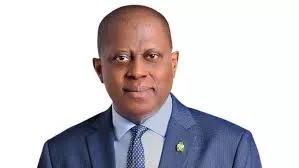Against the backdrop of current economic challenges confronting the country, the Governor of the Central Bank of Nigeria (CBN), Mr. Olayemi Cardoso, has tasked officials of the apex bank and other government functionaries to be prudent in the management of public funds.
Cardoso spoke at the Regional Workshop on Project Management, Monitoring and Evaluation Using Result-Based Management Framework, organised by the West African Institute for Financial and Economic Management (WAIFEM), in Abuja, this afternoon.
He mentioned that following inadequacies of resources there has been pressure on public finances and governments have to implement fiscal measures to balance competing priorities with available resources.
The CBN boss who was represented by Dr. Yusuf Bulus, Deputy Director, Monetary Policy Department of the bank, noted that several sectors of the economy were facing funding challenges and that as such public officers must devise means uptimisng value for money.
Speaking on “Project Management, Monitoring & Evaluation Towards Efficient Resource Utilization”, the CBN governor said, “The world today is fraught with challenges across all sectors of the economy – health, education, construction, etc.
“Resources are increasingly becoming inadequate to address these emerging challenges. Managing scarce resources has become necessary in a tight fiscal environment characterised by growing human conflicts, geoeconomic fragmentation, cost-of-living crunch, and climate change, amongst others.
“These conditions have put pressure on public finances and governments have to implement fiscal measures to balance competing priorities with available resources.”
In light of the above, the CBN boss identified Monitoring and Evaluation (M&E) as an important component of project management and implementation that required due attention as governments and organisations assess, design, and implement crucial interventions.
According to him, “Monitoring and evaluation framework is the foundation of any development project and is key to its successful implementation in achieving the envisaged project goals and objectives.
“Starting a project without one is akin to starting a business without enough financial resources.
“Monitoring is a continuous process by which stakeholders obtain regular feedback on progress towards achieving the set milestones and results- often focusing more on process, activities, inputs, and outputs.”
In his address, the Director-General of WAIFEM, DR. Baba Musa, said that the regional workshop was organised in order to equip public officials with necessary tools to increase their M & E calacities, which would in turn, positively affect project implementation in member countries.
The D-G said, “The success of a project is dependent upon the identification of the defining moments throughout the phases of the project execution. This encompasses the life cycle of a project which includes the main phases such as initiation, planning, execution, monitoring, evaluation, and closure.
“You can perform an evaluation test after every phase to ensure that progress is sustained up to the end of the project. Poor management of project outputs and outcomes can result in the objectives of the project not being realized. Monitoring and evaluation help in this regard as a continuous management function to assess if progress is made in achieving expected results, spot bottlenecks in implementation, and highlight whether there are any unintended effects or risks.
“The workshop is expected to equip participants with skills in setting up and implementing projects and how the monitoring and evaluation systems work.”
The Institute was established on July 22, 1996, by the central banks of five Anglophone West African Countries: The Gambia, Ghana, Liberia, Nigeria, and Sierra Leone.
The Institute’s primary mandate is to develop a critical mass of skilled professionals and leaders in the fields of macroeconomic and financial management as well as governance and institutional development among the staff and other government officials.
